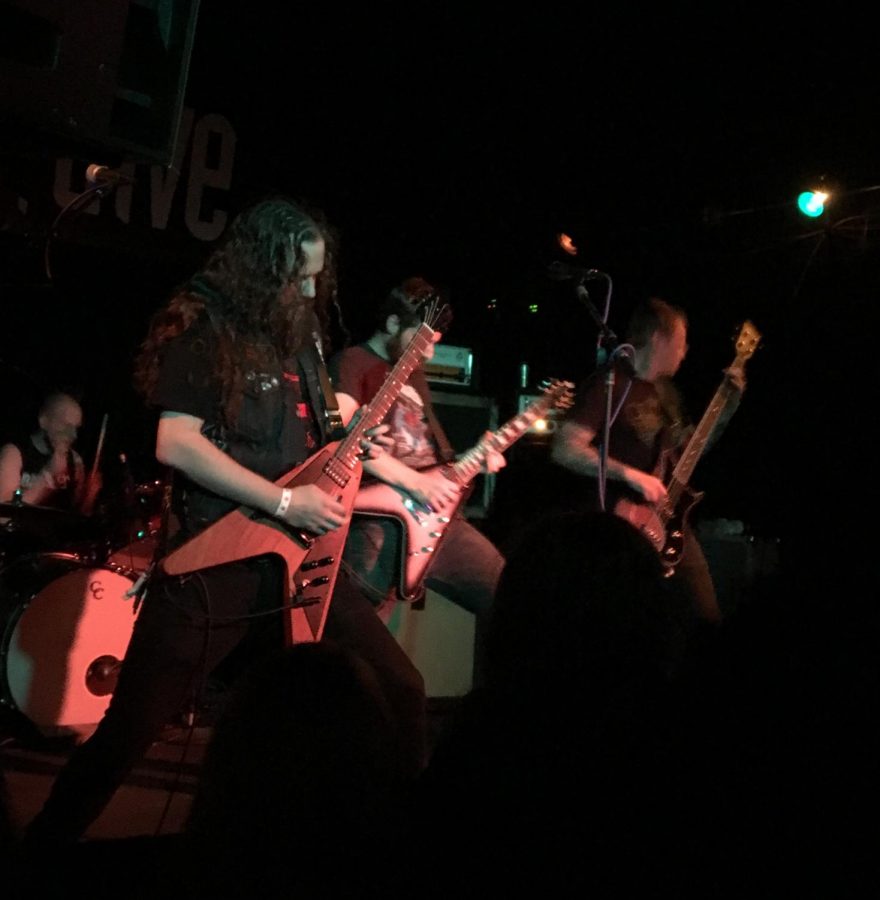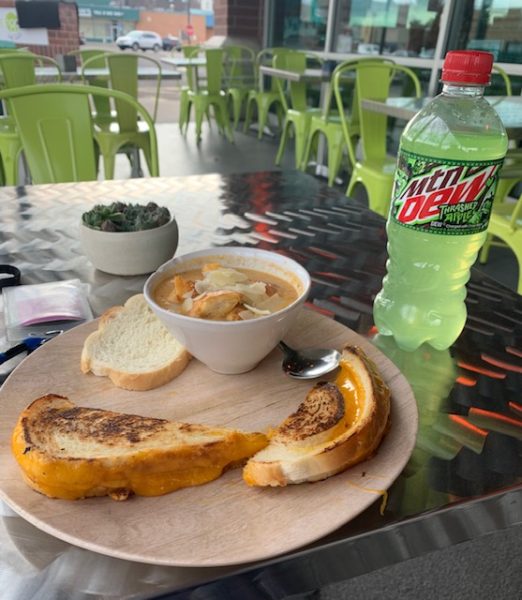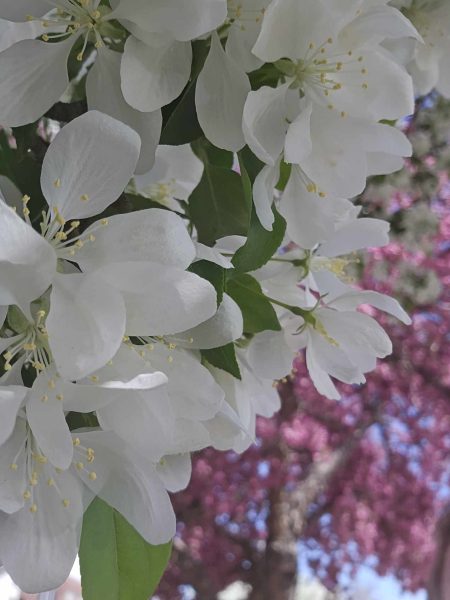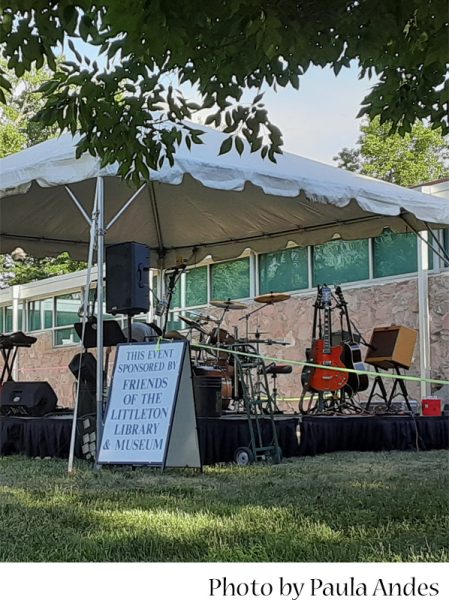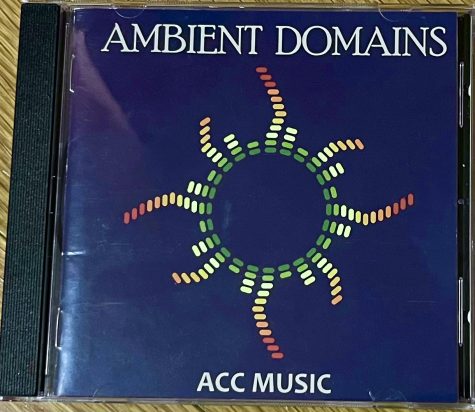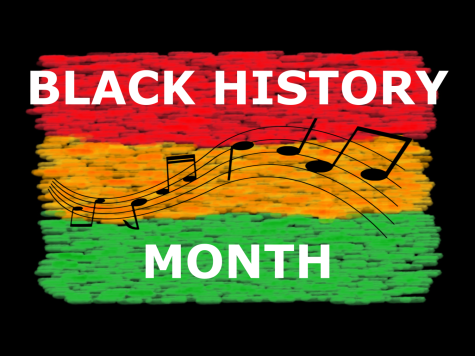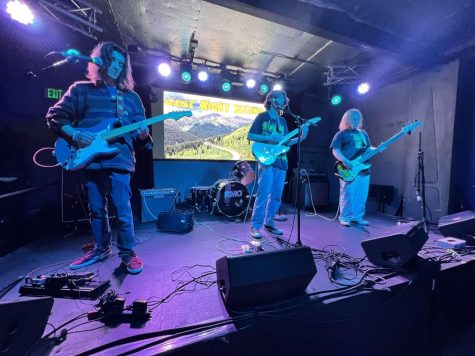“We have the best scene right now in the country”: An exclusive interview with Phil Pendergast of Khemmis
Denver heavy metal wizards Khemmis have traversed a rapid ascent since the release of their debut LP almost three years ago. In that short time span, the quartet has been prolific, releasing a split with Spirit Adrift, an exclusive track for Decibel Magazine’s Flexi Series and another full-length with the third full-length imminent. They joined Oathbreaker on their U.S. tour in 2017, and this year they were a part of the annual Decibel Magazine Tour alongside Enslaved. This year also saw the group perform in Europe for the first time and sign with mammoth label Nuclear Blast for distribution outside of the U.S.
The union of this steady activity with releasing a quality product has garnered Khemmis acclaimed notoriety within a Denver scene that continues to develop along with the band.
Ahead of the release of their excellent third full-length record Desolation, Khemmis vocalist and guitarist Phil Pendergast was kind enough to sit down for a phone interview with music writer Jake Tharan to discuss the impending new record, Khemmis’ European debut, the limitations of genre labels, the new Tomb Mold record, and the burgeoning heavy music scene in Denver.
Jake Tharan: Congratulations on signing with Nuclear Blast.
Phil Pendergast: Thanks, we’re not really signed with them per se; it’s like a licensing deal with 20 Buck Spin, so we don’t really have the full benefits of being on Nuclear Blast yet, but we’re definitely seeing that it makes a huge difference for the amount of press that we’re getting in Europe and how many interviews we’ve done in Europe, and it seems like basically all of the major publications over there have been interested in [Desolation]. So we’re hoping that it just means that more people over there can get access to the records and actually be able to get a physical copy because previously it’s been really hard with the last two albums. We just didn’t have distribution basically outside of North America. Even in Canada it was difficult. So I think it will help us a lot, just in terms of getting the records into people’s hands, getting them into record shops. So that’s really kind of the most exciting thing about it.
JT: Absolutely, that’s awesome, good for you guys for getting that. Did that play a bigger part in you guys playing Roadburn as well?
PP: No because we kind of finalized details about playing for Roadburn before we announced that we did anything with Nuclear Blast, so as far as know I don’t think it really did anything, but it certainly helped, after we had booked Roadburn, trying to kind of figure out an agent that we could work with and figure out the other two dates that we needed to put together to make it financially make sense to get us over there. It certainly helped to be able to say, ‘oh look, we’re on the Nuclear Blast website now,’ and you know you can book a show with confidence that we’re not just going to be some, you know, like Lynyrd Skynyrd cover band or something.
JT: Definitely.
PP: Although, that would kind of rule, too, so I don’t know.
JT: Yeah, depending on who you had in there that would be pretty gnarly.
PP: Yeah I know (laughs)
JT: How did those European shows go for you guys; what was the reaction like from the crowds?
PP: It was really cool; you know, probably the biggest difference between playing there and playing in the U.S. is that the hospitality is so much better in Europe for musicians. So it’s pretty standard that they put you up in a place the night that you’re playing, you don’t have to pay for that. And they’ll provide a home-cooked meal for you, you don’t have to pay for that. So you know that’s a huge boon to people who are used to spending a good portion of their earnings from playing a show on a hotel and a meal, to not have to worry about those things. Let’s just focus on actually performing, which is kind of the point, so that’s awesome.
And people were really cool, man. They were like, very excited that we finally made it over there and some people were kind of accosting us for taking so long. As far as I know, everyone that came to the show, they were a pretty rapt audience. They seemed to be paying a lot of attention, and some of them were slow to kind of warm up to things, but then would get way more into it than the majority of American audiences that we’ve played to. It’s kind of funny because, after the show, a couple of occasions there were some guys that would come up and sort of offer their critique of the performance, which I thought was super hilariously German, because this was definitely a thing that only happened in Germany. Basically saying “hey you guys are great, love the guitar work, love the vocals, but I think you guys should play a little bit slower sometimes.’ You know stuff like that, which I thought was hilarious. It’s just very different, nobody has ever done that in the U.S. before. Maybe people would be like ‘oh you guys were great, but whoever was running sound fucking sucked.’ You know, or something like that, but not something so specific to the actual music that they were paying attention to. They were like, ‘you know what I should tell these guys that they probably haven’t thought about maybe playing slower, so they should maybe do that.’ I thought that was really funny.
JT: That is funny. So they would just pick out specific areas of your guys’ set or your guys’ playing and say ‘you know what, this needs to change a little bit.’
PP: Exactly, yeah it was like constructive criticism you know? And then would buy all of your shit and buy you a beer and make you take a million pictures of them with their girlfriend or something. They were super-positive and then they would still have this critical thing, and I actually kind of appreciate that ‘cause I’m sort of a critical person generally anyway. So I feel like a lot of the time in my mind I’m sometimes thinking something like that when I’m seeing a band if I’ve never heard them before. I’m like ‘Ah man I really like this but I wish this was this thing.’ So I kind of appreciated the blunt honesty of the German.
JT: Yeah, that actually sounds like a pretty decent fan right there.
PP: Absolutely, I mean, I don’t know. It takes more effort to care enough to listen to something that deeply than it does to get hammered, which this guy definitely was that I’m talking about right now, definitely hammered. But, to get hammered and be like ‘fuck yeah!’
JT: Definitely. Desolation is fantastic by the way. Like its predecessors, it sounds like Khemmis, and you can tell it’s you guys when you hear it. But it sounds like you guys are truly growing as songwriters and tightening up your approach to music, especially with the leads. It sounds like you guys are carving out a sound that is wholly your own, just totally Khemmis. Does it feel that way to you guys?
PP: Thanks, I think that was what we were going for, so I’m really happy that that comes across successfully for you.
JT: Absolutely.
PP: We were definitely with this album trying to branch out and trying to incorporate some new elements of music that we enjoy that has always inspired us, but that we didn’t really explicitly do anything with before. So there’s like a couple of death metal riffs on the record and some of the fills, rather than being rock n’ roll rhythmically, which is typically what we’ve done in the past, get a little bit more ‘metal’ quote, unquote this time. And then the leads— I think that’s probably just mostly a function of us being better at our instruments from playing live so much and from really trying to challenge ourselves to write a more challenging album this time.
It’s kind of funny because when we were going into the studio to record the record, our producer Dave [Otero] who has done all three of our albums, was like ‘holy shit, there’s at least three times as many things happening on this album than on any of the other stuff,’ but it’s actually a shorter record. He was a little bit concerned that we wouldn’t be able to bring the songs in enough to make sense, and a lot of that fell on the vocals and on the ability for them to convey what the song structures are supposed to be and provide some memorability for parts because there’s so many different sections that occur throughout the album. That was kind of another interesting challenge related to trying to keep something that you can identify as Khemmis and that had some instant gratification and memorability, but that sort of devise is the tricky nature of musically what’s going on.
What we really wanted to accomplish by doing that wasn’t just to make it more complicated for the sake of that being the goal, it was really that we thought that the previous records probably, at least to us, made a better impression initially but then didn’t offer a lot more once you dug into it over repeated listens. That we really wanted this record to be more of a grower, where because it’s more complex, the more that you listen to it the more that you start to understand all these cool things that are going on and that it pays off more over time than just initially. Because we appreciate records that do both of these things, but especially over the course of your life the ones that you return to the most, I think, are the ones that still reward you with some new things every time you listen.
We wanted to kind of strike the balance between trying to include songwriting techniques and memorable vocal parts that would help make the songs become initially memorable but then having the instrumentals underneath being surprisingly complex to where if you return to it every day for a couple weeks every time you listen to it hopefully something new pops out and you’re like ‘oh shit, that’s really cool how the kick drum ends up leading into what the next riff is going to sound like.’ Little things like that that you start to pick up on the more you listen to something.
JT: Yeah absolutely, the record is actually quite progressive in nature.
PP: Yeah, like I said I don’t think it’s like a deliberate idea to try and be progressive. I don’t think we’re trying to be Opeth or anything like that, but that it’s kind of just out of the nature of trying to write something that’s interesting songwriting-wise for us and also felt like it would be something that kind of has these richer, deeper rewards to listen to it, more than every day for a couple weeks. Something that you could be listening to for the rest of the year and by the end of the year be more impressed than you were the first time that you heard it.
JT: Absolutely, I think that’s probably one of the best journeys to go on is finding a record like that where you can continue to listen to it and find all these new things were hidden that you didn’t notice the first time, so I definitely agree.
PP: Yeah, exactly….yeah I agree completely.
JT: Speaking of your vocal performance on this record, this is some of the strongest, most expansive vocal performances within these three records that you guys have put out. It sounds like you’re finding your own style as a vocalist, would you say so?
PP: Yeah, thanks, I think that I always kind of had an idea of what I wanted to do, my idea for how I wanted to approach the vocals for this band. So I remember saying before, when we started this band, that I just decided we should have clean singing because there were no other bands in Denver that were doing that with these heavy riffs and stuff. So that seemed important to establish ourselves as something different. I realized that I could only really sing in one way, when we were starting off, which was kind of like a very clear, pretty bright kind of tonality that came off to me as being sort of similar to some of the blue-eyed soul singers from the 60’s and 70’s, like Steve Winwood, if you know the bands Traffic and Blind Faith and his own solo stuff, or Van Morrison, or maybe a little bit like David Bowie or something sometimes. I realized that was what I was going to be able to do rather than, you know, a Bruce Dickinson type of like more powerful sounding vocal delivery.
Knowing that, I thought about [how] that could work with this, was if delivering pretty melancholy lyrics with a feeling of detachment emotionally, deliberately trying to tone down the emotion, that I thought that actually better captured the spirit of something that’s pretty doomy. I think it’s more depressive to sound detached emotionally from something than to be like Messiah Marcolin from Candlemass – super emotive all the time. That was kind of what I started trying to do, and as I’ve gotten better as a singer, I’ve realized that I can still keep that same idea but I can be more emotive and I have adopted a tonality that’s close to my speaking voice. Really my voice is like a baritone and on this new record, I think that’s way more apparent than in the past ones in terms of how we mixed the vocals. We really put a lot of time into the vocal sound on this record and on the performances. I wanted to be totally happy with it, and I think that we were successful in that.
So I think that just through having to perform a lot more and because I wanted to write more demanding vocal parts with more range and more power for this record. I kind of had to respond and I think that that helped maybe define sort of what you’re talking about, about having a more signature sound on this, would be just by pushing harder and delivering more emotive sounding vocals. I think it still retains what I was going for initially but it’s more unique to me, more singular. The cool thing for me is that I don’t immediately think of anybody that it sounds like anymore, when I hear my vocals on the record. That’s really both the cool and exciting things for me is that I think that it’s kind of a unique tone and sound.
JT: Yeah, you’re finding some authenticity with your delivery, that’s great. And what’s compelling about your guys’ sound with the vocals and the music, especially with this record, is I don’t think you guys can really be described as just a doom band. Your sound is clearly heavy metal but it retains a lot of accessibility while merging darkness with harmony and with that in mind would the “doom” tag be a little too confined to describe you guys, you think?
PP: Yeah, I mean, on Absolution we were fine being labeled as doom. And with Hunted we were really pretty explicit with how we wanted to market the album as it wasn’t mentioning that we were a doom metal band, but everybody still called it that. And that was a little upsetting to us because it felt like it was a heavy metal record that just happened to be slower-paced generally. So for this record, we wanted to be even more explicit about, in terms of the writing, trying to avoid coming off as being too doomy, other than that the lyrics are always pretty dark and the melodies are pretty melancholy or dark sounding.
That aside, I think what we would prefer is that we’d be a band kind of like High on Fire. Sort of releasing very sludgy doom shit at first, kind of like on [High on Fire’s] Blessed Black Wings, really trying to develop into a band that would be hard to classify as anything other than just a heavy metal band. We would like to follow a similar trajectory. We’re hoping that with this record that people can put to rest the idea that ‘okay we’re going to have to think about this record as being a doom record’ and from that perspective, some of the shit we do doesn’t make any sense and doesn’t fit. And some people might not like it because of that, because they have preconceived notions about what they think a doom album should sound like and if it doesn’t meet those, then it might be disappointing.
But I think really, if anything, it harms us to be thought of as a doom band anymore. I’ve seen plenty of people say things online where they’ll say ‘Oh, I never checked out this band before because they’re called doom and I think it’s boring and slow.’ That doesn’t help us at all to be associated with those things because that’s not how we sound. So I think it’s important to us that we try to assert ourselves and be really concrete and musical with this one and that we do way more than just playing slow riffs and the songs aren’t repetitive.
There are still moments definitely, like especially the last track on the album, that are pretty hard to say are anything other than a doom song. But if we were going to do that, we wanted to make sure that we did it better than we had ever done it before. So that’s kind of the motivation behind some of the musical direction of this record and also how we wanted to be perceived. So I think you’re right, we really don’t want to be considered just a doom band anymore. I think ‘doomed heavy metal’ or ‘doomy metal’ is fine but really I think we’re just a heavy metal band. We’re more inspired by Judas Priest and Mercyful Fate and Celtic Frost than we have ever been by Candlemass and My Dying Bride and those bands like that.
JT: Definitely, upon first listen when I heard the record, I was like ‘alright, at this point I wouldn’t even describe Khemmis as a doom band.’ It doesn’t seem like it fits the sound anymore. Even online some of the comments I see on your videos are people comparing you guys to Trivium and bands like that, and while I think it’s an odd comparison, I think that’s still probably more of a positive thing.
PP: Exactly, yeah, I mean I’ll take it. I mean Trivium opened up for Metallica on a very long tour that they did, and Trivium has millions of fans and they get played on the radio. And I wouldn’t mind us opening for Metallica and getting played on the radio, you know? It’s not that we’re trying to write something that’s dumbed down and more mainstream, but there’s definitely something about just being a metal band that can expose you to a wider audience and have more people accept the music.
And even non-metal fans I think generally get exposed then to those bands who don’t get so classified and hidden underground by these subgenre tags. And I think there’s a real possibility that people who don’t necessarily like metal will like us. So, I think you’re right though, like ‘what the fuck, why are people comparing us to Trivium!?’ But at the same time I don’t think it’s a bad thing and I think as long as they actually listen to it for what it is, then it’s actually probably a good thing if it comes out that way.
JT: I agree with that. So, in Denver bands like you guys, Primitive Man, Spectral Voice, Blood Incantation, Of Feather and Bone; you guys are all playing an integral part in the scene right now as it blows up across the national and international media. I think one of the best parts about these bands is, in terms of full-length releases, there’s a lot to look forward to and a lot of output that can happen from all of you guys. So I’m interested to hear what you guys think the future for the Denver heavy music scene could develop into.
PP: Well, here’s the thing: I think that we have, without exaggerating, the best scene right now in the country. Based on us having played in pretty much all the other places that have scenes that have bands and playing with local bands in those areas, you know a lot of these bands are really good. But I don’t think that they have the depth of the Denver scene in terms of the variety of bands, the quality of those bands. Any night in Denver you can go to a show at the Hi-Dive or the Marquis or Herman’s or wherever, and you can see some local band open a show and maybe come away thinking that that local band was better than the band that you intended to go see. But I doubt that that’s the case anywhere in the country right now, with the same sort of frequency that that happens here.
The thing that I think sets the Denver scene apart in all those bands that you just mentioned, who are all amazing, is that none of these bands are playing something rigidly adhering to a genre. Like how I’ve held in expressing some frustration at being labeled as doom when really our influences are more traditional heavy metal and classic rock. None of the other bands right now that are doing really well in the Denver scene are doing something that is straight-to-style, you know? Primitive Man is just as much a noise band as they are, I guess people label them as doom metal also, but we couldn’t sound any more different from them. And they’re definitely kind of a hardcore band and kind of a black metal band, you know it’s impossible to label them with one thing. Even with Blood Incantation, even though I would say they’re pretty rigidly a death metal band, they have lots of doomy sections, they have lots of very psychedelic influences in the guitar leads and the tones, there’s a lot of progressive song structuring. Spectral Voice—it’s like, are they death metal or are they a doom metal band? It doesn’t really matter, they’re somewhere in between the two, and they also incorporate all this crazy psychedelic sort of stuff, you know?
JT: They’re spacey.
PP: Yeah, exactly and then Of Feather and Bone they basically started out as a hardcore band pretty much to a T and have gotten crustier and incorporated more death metal influence over time and now I don’t really know how to categorize them. So I think that’s really the thing about our scene is that all the bands here seem to be pretty fearless in terms of taking whatever inspiration comes to them and going with it and forging their own path. Wayfarer’s newest record is one of my favorite ones so far this year, and it’s like a really cool mix of things that I don’t know if I’ve ever heard before. Like kind of the old west, sort of Ennio Morricone-y, soundtrack-y kind of things mixed with rockin’ black metal type shit? I don’t know. There’s just so many examples of this in the Denver scene.
And a lot of these other places a lot of the bands that we’ve played with very much sound like what they’re going for, which is fine, but it’s not something that defines a scene the same way that Denver is doing right now. And I feel like I could talk about this forever but I don’t want to take up all the time doing that but I’m really glad that it’s something that people are starting to write about and take notice of right now because there’s been no attention given to Denver bands nationally and internationally before five years ago or so. Right around when we started, Primitive Man were kind of the first ones to be sort of picked up and looked at at that level, I think. It’s really exciting to be growing as a band at the same time the scene is growing and to use it as an opportunity to cast more light on how great the music is right now.
JT: Yeah I absolutely agree. Any given night here, regardless of genre too, whether you’re driving down Colfax or going down South Broadway or to Red Rocks or Fiddler’s or whatever, there’s shows going on every night with really solid local musicians playing and opening.
PP: Yeah, it’s such a unique thing. That’s just not something that you get in most cities, so it’s a really fun time to be doing stuff here. It’s kind of an honor for us to be people that are sort of seen as torchbearers for the scene right now because it really means a lot, all of the support that we’ve gotten locally that has let us get to where we are. None of that would have happened without people taking a chance on us and thinking that we were doing was cool. I could see in a lot of other places, people not being at all into what we were doing and who knows if we would have ever even recorded a record if people weren’t expressing the same level of excitement as they were here. So, you know, it’s a really healthy place for people to be creating the art that they really want to be making without having to be forced into some kind of bullshit category or whatever.
JT: Hell yeah. It’s exciting. It’s fun even from a fan’s perspective to be witnessing that and watching everything going on onstage each night.
PP: Yeah, I mean I enjoy it too. I’m gonna go see Of Feather and Bone next week when they come through on their tour because they’re touring with Tomb Mold who are just about to put out what will maybe the best death metal album of the year. Have you heard that thing yet?
JT: Yes, it’s gnarly.
PP: It’s so good. I don’t know it’s just super weird.
JT: It is!
PP: The cover art for that thing is a perfect encapsulation of what it makes me think of, you know? It feels like there’s all these different caverns that you can go in while you’re listening to it and explore and it will just be filled with more infinite, crazy sights to see and alien figures and fungus growing everywhere. I don’t know, I’m kind of a visual person and I always like when the album art represents nicely what the music does and I feel like it’s a really good marriage of those two things on that record.
JT: Absolutely, the cover art is wicked and it does reflect the music. But I really appreciate you taking some time to talk man.
PP: Of course man, I’m really glad that you’re interested in writing something. I’m really happy that there’s somebody who’s interested in hearing about it and talking about it.
Immense gratitude is due toward Phil and Khemmis and David at Earsplit PR for making this interview possible.
DO NOT miss the new Khemmis record Desolation, which will be released on June 22nd through 20 Buck Spin and Nuclear Blast.
Catch Khemmis at their album release show on Saturday, July 7th at the Hi-Dive, where they will be performing the new record in its entirety. Tickets are available here.

Jake Tharan is a second year journalism student at ACC. He is the current Entertainment Editor for the Arapahoe Pinnacle, having contributed as a music critic and reporter in the past. Heavy metal is his aural pleasure, but he...



